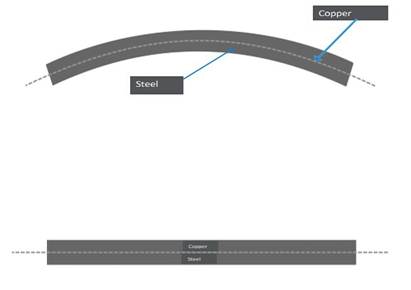Two identical rectangular strips, one of copper and the other of steel, are riveted together to form a bimetallic strip (αcopper > αsteel). On heating, this strip will

Linear expansion coefficient of copper is greater than the steel (αcopper > αsteel). So, on heating copper gets more expansion than steel. So the bimetallic strip will bend with the copper on the convex side.
Linear expansion mathematically expressed as
![]()
Where,
∆L = change in length
L= original length
α = Linear coefficient of thermal expansion
∆T = change in temperature
Linear expansion coefficient for steel and copper are mentioned in the below table.

Conclusion line missing??
1